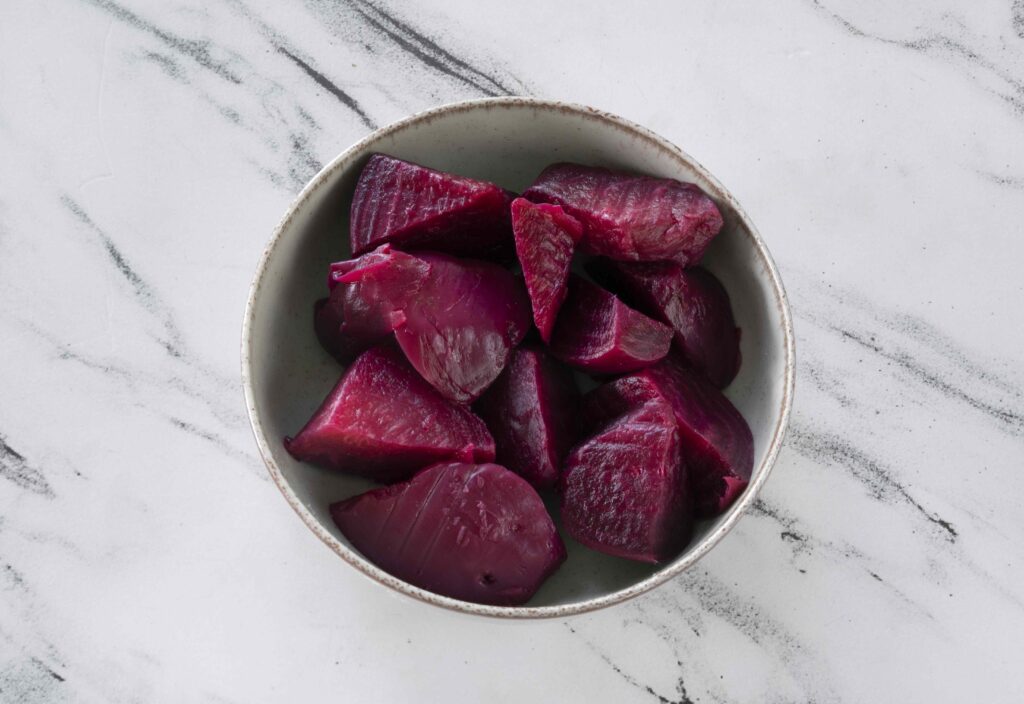Beets—also called beetroot or Beta vulgaris—may have a number of health benefits when eaten regularly. These vibrant root vegetables are originally from the Middle East but are eaten worldwide.
Here’s what happens when you incorporate them into your diet.
Beets are rich in nitrates, which your body converts to nitric oxide. Nitric oxide is a compound that relaxes and dilates blood vessels, which can improve nutrient and oxygen circulation.
The nitrates in beets could support athletic performance. Nitrate supplementation has been shown to increase distance and power in adults. It may also improve endurance by lengthening the time to exhaustion.
One cup of raw beets supplies 3.81 grams of fiber, which is about 13.61% of the Daily Value (DV).
Fiber is a carbohydrate that helps support digestion. It adds bulk to your diet, which helps you feel full for long periods and regulates bowel movements.
Beets are also rich in betalains, a class of potent antioxidants and anti-inflammatory compounds.
Antioxidants help counter the harmful effects of free radicals—unstable atoms that may increase oxidative stress. This type of cell damage contributes to heart disease, obesity, and cancer risk.
Beets do not just have a potentially positive impact on your blood pressure. They are also rich in a plant-based amino acid called betaine.
Betaine helps lower blood levels of homocysteine, a chemical your body uses to make proteins. At high levels, homocysteine can increase your risk for heart disease.
The nitrates in beets have been shown to possibly improve cognitive function in older adults.
Blood flow naturally decreases as you age, but nitric oxide can help improve the circulation of oxygen-rich blood to your brain. More research is needed to confirm this benefit.
Your liver does the heavy work of filtering your blood and “detoxing” your body. The betaine in beets can support liver function in people with non-alcoholic fatty liver disease (NAFLD).
Betaine may also protect against liver-related and other diseases, among many other benefits.
One cup of raw beets contains nutrients like:
- Calories: 58
- Fat: 0.231 grams (g), or 0.30% of the DV
- Sodium: 78 milligrams (mg), or 3.39% of the DV
- Carbohydrates: 13 g, or 4.73% of the DV
- Fiber: 3.81 g, or 13.61% of the DV
- Added sugar: 0 g
- Protein: 2.19 g, or 4.38% of the DV
Beets are also a source of several vitamins and minerals, including potassium, folate, and vitamin C.
Potassium supports heart, muscle, and nerve function. Folate is a B vitamin that supports tissue growth and red blood cell production. Vitamin C helps with skin, bone, and teeth health.
It may seem like a good idea to have beets daily because of their benefits, but if these vegetables make up a bit part of your diet, watch out for:
- Kidney stones: Beets contain a plant-based compound called oxalate. Consuming foods or drinks with high oxalate content may lead to the formation of kidney stones.
- Stool and urine color changes: Eating beets may temporarily turn your stool red or your urine pink and red. Get medical attention right away if your stool or urine is red and you have not had beets. Red stool or urine could be signs of anal fissures, renal (kidney) failure, or urinary tract infections (UTIs).
- Allergies: A beet allergy is not considered one of the common food allergens. Although rare, eating or drinking them may cause an allergic reaction in some people.
There are several ways to prepare beets and add them to your diet. You can bake, boil, or roast them, or eat them raw.
Other ways to consume beets include:
- Add raw or pickled beets to salads or coleslaw.
- Drink beet juice.
- Slice beets into chips.
- Use beets with yogurt or garlic for dips.


